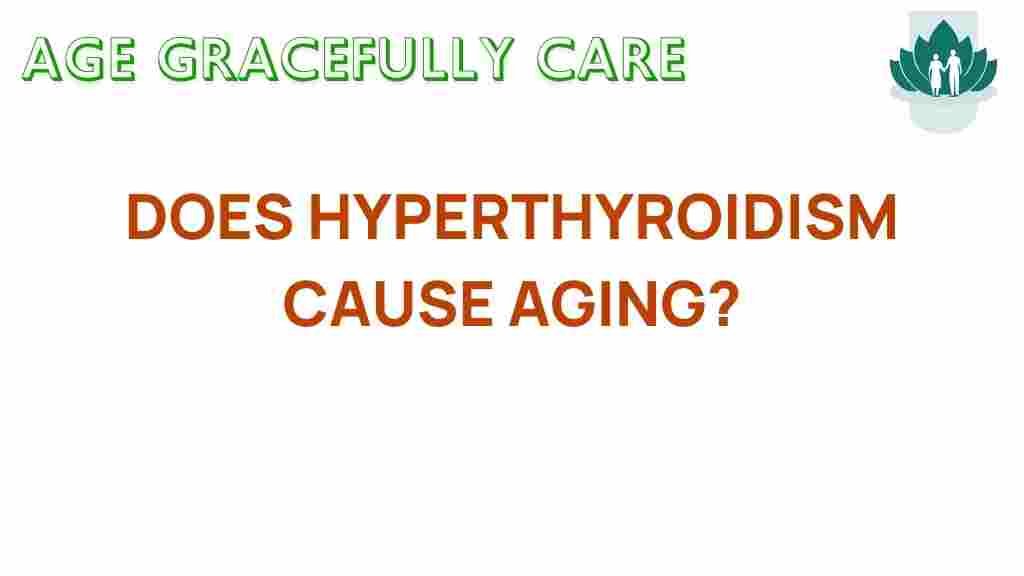Unraveling the Mystery: Does Hyperthyroidism Accelerate Aging?
Hyperthyroidism is a condition characterized by the overproduction of thyroid hormones, which can lead to a variety of symptoms and health concerns. With its connection to metabolism and overall wellness, many people wonder whether hyperthyroidism might contribute to accelerated aging. In this article, we will explore the relationship between hyperthyroidism and aging, examining how thyroid health impacts longevity and the risks associated with hormone imbalances.
Understanding Hyperthyroidism and Its Symptoms
Before delving into the effects of hyperthyroidism on aging, it’s essential to understand what hyperthyroidism involves and the symptoms it can present. Hyperthyroidism occurs when the thyroid gland, located in the neck, produces an excessive amount of thyroid hormones—primarily thyroxine (T4) and triiodothyronine (T3).
Common symptoms of hyperthyroidism include:
- Rapid heart rate
- Increased appetite
- Weight loss
- Nervousness or anxiety
- Heat intolerance
- Sleep disturbances
- Fatigue
- Muscle weakness
- Changes in menstrual patterns
These symptoms can significantly affect an individual’s quality of life and overall wellness, making it crucial to address any signs of thyroid health issues promptly.
The Role of Thyroid Health in Metabolism
The thyroid gland plays a vital role in regulating metabolism, which is the process through which the body converts food into energy. When the thyroid gland is overactive, it can lead to an increased metabolic rate. This heightened metabolism can cause the body to burn calories faster than usual, resulting in weight loss and increased energy levels.
However, a consistently high metabolic rate can also lead to negative health consequences, particularly if it remains unchecked. The body’s systems can become strained, and this stress can potentially contribute to premature aging.
The Link Between Hyperthyroidism and Aging
The question of whether hyperthyroidism accelerates aging is complex. While some studies suggest that hyperthyroidism may lead to signs of premature aging, such as skin changes and bone density loss, others indicate that the relationship is not straightforward.
Potential Health Risks Associated with Hyperthyroidism
Hyperthyroidism can lead to several health risks that may impact longevity. Some of the main health risks include:
- Heart Problems: An accelerated heart rate can lead to palpitations and increase the risk of heart disease.
- Bone Loss: Hyperthyroidism can lead to a decrease in bone density, increasing the risk of osteoporosis.
- Muscle Weakness: Prolonged hyperthyroidism can lead to muscle atrophy and weakness.
- Thyroid Storm: A rare but life-threatening condition that can occur in untreated hyperthyroidism, leading to severe complications.
Addressing these health risks is crucial for maintaining wellness and preventing long-term complications that could affect aging.
Hormone Imbalance and Its Effects
Hyperthyroidism is a form of hormone imbalance, which can have widespread effects on the body. Hormones play a crucial role in regulating numerous bodily functions, including metabolism, mood, and energy levels. An imbalance can lead to:
- Increased anxiety and irritability
- Difficulty concentrating
- Unexplained weight changes
- Changes in skin texture and hair health
These symptoms can contribute to an overall feeling of aging and decline in quality of life, making it imperative to manage thyroid health effectively.
Managing Hyperthyroidism for Better Aging
To mitigate the effects of hyperthyroidism on aging, it’s essential to adopt a proactive approach to thyroid health. Here are some steps to consider:
1. Regular Monitoring and Testing
Regular check-ups with a healthcare provider are crucial for monitoring thyroid function. Blood tests can measure levels of TSH (Thyroid Stimulating Hormone), T3, and T4, providing insight into thyroid health.
2. Medication Management
If diagnosed with hyperthyroidism, your doctor may prescribe medications to help regulate hormone levels. Common treatments include:
- Antithyroid Medications: Such as methimazole, which reduce hormone production.
- Beta-Blockers: These can help manage symptoms like rapid heart rate and anxiety.
- Radioactive Iodine: This treatment destroys overactive thyroid cells.
3. Lifestyle Changes
Incorporating healthy lifestyle changes can also support thyroid health:
- Balanced Diet: Consume a diet rich in whole foods, including fruits, vegetables, lean proteins, and healthy fats.
- Regular Exercise: Engage in regular physical activity to support metabolism and overall wellness.
- Stress Management: Incorporate techniques such as yoga, meditation, or deep-breathing exercises to manage stress.
4. Educating Yourself
Staying informed about hyperthyroidism and its effects on aging can empower you to make better health decisions. Resources like the American Thyroid Association provide valuable information.
Troubleshooting Common Issues
It’s not uncommon for individuals with hyperthyroidism to experience fluctuating symptoms. Here are some troubleshooting tips to help manage common issues:
1. Managing Symptoms of Anxiety and Irritability
If you experience heightened anxiety, consider incorporating calming practices into your daily routine:
- Practice mindfulness or meditation.
- Engage in regular physical activity to release endorphins.
- Limit caffeine and sugar intake, which can exacerbate anxiety.
2. Addressing Sleep Disturbances
Sleep issues can be prevalent with hyperthyroidism. To improve sleep quality:
- Establish a regular sleep schedule.
- Create a calming bedtime routine.
- Avoid screens before bedtime.
3. Supporting Bone Health
To counteract potential bone loss:
- Ensure adequate calcium and vitamin D intake.
- Engage in weight-bearing exercises.
- Discuss bone density testing with your healthcare provider.
Conclusion: The Path to Healthy Aging with Hyperthyroidism
While hyperthyroidism can present unique challenges, understanding its impact on aging and taking proactive steps can help you maintain your thyroid health and overall wellness. By managing symptoms, staying informed, and making lifestyle changes, it’s possible to mitigate the health risks associated with hyperthyroidism and promote longevity.
If you suspect you have hyperthyroidism or are experiencing symptoms, it’s essential to consult with a healthcare professional. Early intervention can lead to better outcomes and a healthier, more vibrant life.
For more information on thyroid health, visit Thyroid Health Resources.
This article is in the category Health and created by AgeGracefullyCare Team

1 thought on “Unraveling the Mystery: Does Hyperthyroidism Accelerate Aging?”